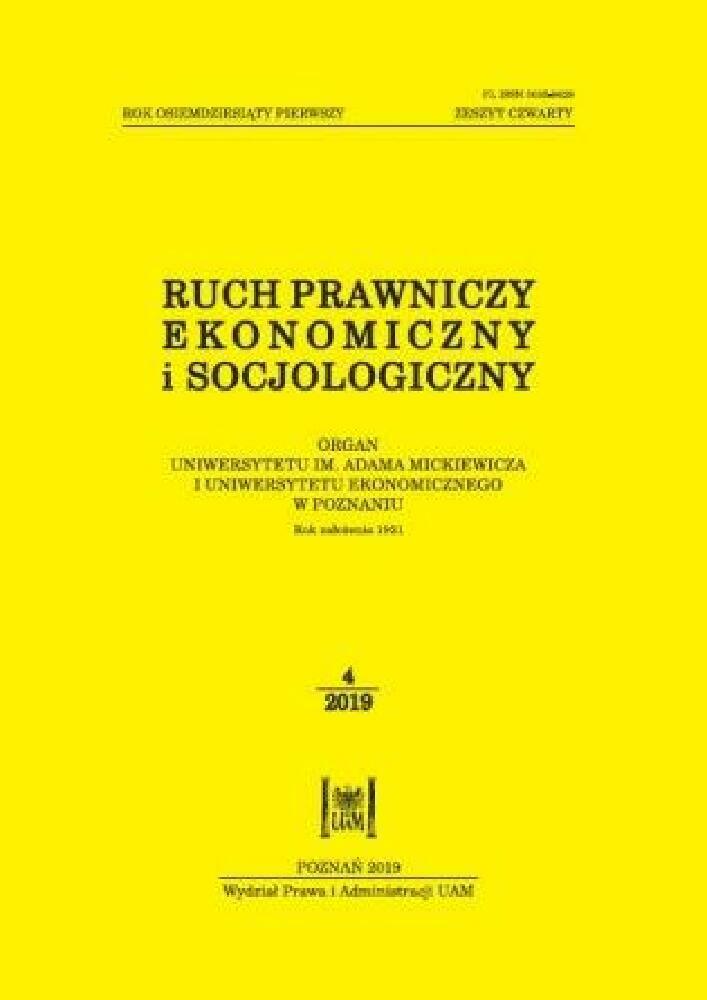Abstract
The inauguration of Nelson Mandela as South Africa’s first democratic president on 10 May 1994 became a symbol of the end of apartheid and the beginning of a new chapter in the country’s history. As South African society was deeply divided, the 1993 Interim Constitution expressed the need for reconciliation between the people of South Africa and the reconstruction of its society. The legacy of apartheid was to be addressed based on ‘a need for understanding but not for vengeance, a need for reparation but not for retaliation, a need for ubuntu but not for victimization’. Due to its introduction into the Constitution, ubuntu – a philosophy of unity, cooperation, compassion and respect for human dignity, which originated in small African communities – became a source of values for the whole legal system. The goal of the text is to present the ubuntu philosophy and to describe its role in the South African transitional justice process and in selected areas of South African law (criminal law, evictions and defamation). On the whole, South Africa
presents a unique case in which both the political transformation and the legal system were strongly shaped by the said philosophical and ethical concepts, which bear close resemblance to the idea of restorative justice.
Funding
Publikacja powstała w ramach stażu naukowego sfinansowanego w drodze konkursu ze środków statutowych Wydziału Prawa i Administracji Uniwersytetu im. Adama Mickiewicza w Poznaniu
References
Bennett, T.W. (Munro, A.R., Jacobs, P.J.) (2018). Ubuntu: An African Jurisprudence. Claremont (Cape Town).
Bohler-Müller, N. (2007). Some thoughts on the ubuntu jurisprudence of the Constitutional Court. Obiter 3(28): 590–599.
Bois-Pedain, A. du (2007). Transitional Amnesty in South Africa. Cambridge.
Comaroff, J.L., Comaroff, J. (2009). Ethnicity, Inc. Chicago–London.
Cornell, D. (2004). A call for a nuanced constitutional jurisprudence: ubuntu, dignity, and reconciliation. SA Publiekreg/SA Public Law 3(19): 666–675.
Cornell, D., Muvangua, N. (2012). Introduction, [w:] D. Cornell, N. Muvangua (eds.), Ubuntu and the Law: African Ideals and Postapartheid Jurisprudence. New York: 1–27.
Czarnota, A. (2015). Między polityką a prawem, czyli o sprawiedliwości okresu przejściowego. Acta Universitatis Lodziensis. Folia Philosophica. Ethica – Aesthetica – Practica 27: 13–35.
Dyzenhaus D. (1998). Judging the Judges, Judging Ourselves: Truth, Reconciliation and the Apartheid Legal Order. Oxford.
Gutowski, M. (2018). Artykuł 5 k.c., [w:] M. Gutowski (red.), Kodeks cywilny. Tom 1: Komentarz do art. 1–352 [Online]. Legalis/el.
Himonga, C., Taylor, M., Pope, A. (2013). Reflections on judicial views of Ubuntu. Potchefstroom Electronic Law Journal 5(16): 370–427.
Keep, H., Midgley, R. (2007). The emerging role of ubuntu-botho in developing a consensual South African legal culture, [w:] F. Bruinsma, D. Nelken (eds.), Explorations in Legal Cultures. Den Haag: 29–56.
Keevy, I. (2009). Ubuntu versus the core values of the South African Constitution. Journal for Juridical Science 34(2): 19–58.
Kordela, M. (2002). „Lex” i „ius” w orzecznictwie Trybunału Konstytucyjnego. Ius et Lex 1: 213–223.
Kordela, M. (2012). Zasady prawa. Studium teoretycznoprawne. Poznań.
Kroeze, I.J. (2002). Doing things with values II: the case of ubuntu. Stellenbosch Law Review 13(2): 252–264.
Krotoszyński, M. (2016). Wykładnia prawa w okresie transformacji ustrojowej, [w:] M. Hermann, S. Sykuna (red.), Wykładnia prawa. Tradycja i perspektywy. Warszawa: 19–37.
Krotoszyński, M. (2017). Modele sprawiedliwości tranzycyjnej. Poznań.
Lekalake, R. (2016). Support for democracy in South Africa declines amid rising discontent with implementation. Afrobarometer. <http://bit.do/afrobar> [dostęp: 19.07.2019].
Matolino, B., Kwindingwi, W. (2013). The end of ubuntu. South African Journal of Philosophy 32(2): 197–205.
Metz, T. (2007). Toward an African Moral Theory. The Journal of Political Philosophy 15(2): 321–341.
Mogkoro, Y. (1998). Ubuntu and the law in South Africa. Buffalo Human Rights Law Review 4: 15–23.
Roux, T. (2013). The Politics of Principle: The First South African Constitutional Court, 1995–2005. Cambridge.
Sachs, A. (2012). Towards the liberation and revitalization of customary law, [w:] D. Cornell, N. Muvangua (eds.), Ubuntu and the Law: African Ideals and Postapartheid Jurisprudence. New York: 303–316.
Sitze, A. (2013). The Impossible Machine: A Genealogy of South Africa’s Truth and Reconciliation Commission. Ann Arbor.
Smolak, M. (1998). Zmiana paradygmatu interpretacyjnego w okresie transformacji ustrojowej w Polsce. Ruch Prawniczy, Ekonomiczny i Socjologiczny 60(3/4): 21–33.
Smolak, M. (2002). Sprawiedliwość transformacyjna na przykładzie Komisji Prawdy i Pojednania Republiki Południowej Afryki. Państwo i Prawo 57(11): 66–73.
Theissen, G. (1999). Common past, divided truth: the truth and Reconciliation Commission in South African public opinion. Paper presented at the IISL Workshop on “Legal Institutions and Collective Memories”. <http://userpage.fu-berlin.de/~theissen/pdf/IISL-Paper.PDF>
[dostęp: 19.07.2019].
TRC (1998). Truth and Reconciliation Commission of South Africa Report. Volume 1. <http://www.justice.gov.za/trc/report/finalreport/Volume%201.pdf> [dostęp: 19.07.2019].
Tutu, D. (2012). To Ugandan MPs: God does not discriminate among our family. Daily Monitor, 12.12.2012. <http://bit.do/monitor-co-ug-tutu> [dostęp: 19.07.2019].
Zajadło, J. (2003). Filozofia prawa a prawo karne. Studium tzw. Mauerschützen. Ius et Lex 1: 175–202.
Ziembiński, Z. (1991). „Lex” a „ius” w okresie przemian. Państwo i Prawo 46(6): 3–14.
Zyl, P. van (1999). Dilemmas of transitional justice: the case of South Africa’s Truth and Reconciliation Commission. Journal of International Affairs 52(2): 647–667.
License
Copyright (c) 2019 WPiA UAM

This work is licensed under a Creative Commons Attribution-NonCommercial-NoDerivatives 4.0 International License.





